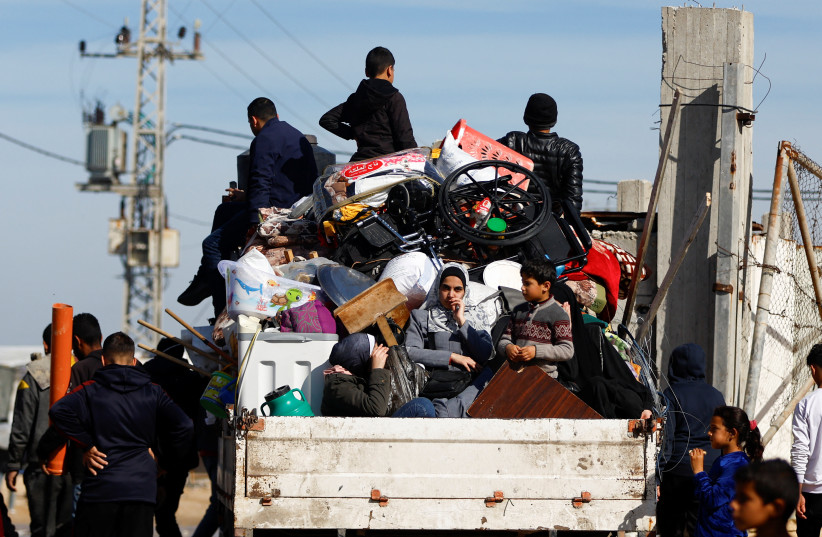As the Israeli military operation in the Gaza Strip continues into its fourth month and local authorities report that nearly 24,000 Palestinians, mostly women and children, have been killed, Palestinians living outside the enclave are watching and worrying whether their relatives inside Gaza have survived the airstrikes, the lack of medical facilities, and the food crisis.
For more stories from The Media Line go to themedialine.org
Husband and wife Osama and Ghada Abu Sultan, originally from Gaza but now living in Bethlehem in the West Bank, both have large extended families in Gaza. The couple say they have not been able to turn off their television since the war began on October 7.
Ghada Abu Sultan's relatives all live in Jabalia, in the north of the strip. On October 24, she received a phone call from her nephew, telling her that her niece, Dima, had been killed in an Israeli airstrike.
Palestinians recount their fears
"I used to follow her Instagram account and was reassured by her posts that they were fine. On the day of her martyrdom, I spoke to her in the morning. Later that day, my nephew called me and told me that my niece Dima had been martyred," Ghada told The Media Line.
"I started screaming and crying," Ghada said. "My husband asked me what was wrong. I told him Dima had been killed. We called her father, and he confirmed it. They were burying her. I told him I wanted to tell her something. I asked him to place the phone near her ear. I wanted to say goodbye to her."

Tragedy had already struck the Abu Sultan family once before, when their son Amjad was shot dead by Israeli forces three years ago.
With Palestinians in the West Bank unable to visit family in Gaza, they now fear that their loved ones may die before they see them.
Ghada said that she had lost 29 family members in the current war. She said that for years before the war, she was unable to visit her parents regularly because Israel restricted Palestinians from moving between the West Bank and Gaza, with rare exceptions.
Osama, a Palestinian Authority employee who moved his family to the West Bank more than a decade ago, said he had not been back to Gaza in 23 years, not even for an uncle's funeral.
Unable to reach relatives in Gaza
"Six of my uncles were martyred and many were injured, but we don't know the whereabouts of the rest, and communication is the only way to know what is happening. When we get hold of them, they ask us about the news and what is happening," Osama told The Media Line.
Both Osama and Ghada said they constantly try to call their families and friends in Gaza. Ghada said she tries several times a day, but usually cannot get through.
Osama said he had managed to reach a nephew, whose arm had been amputated after his house was hit by an Israeli shell. The nephew told Osama that he was sending his family to Rafah, in the southern part of the Gaza Strip, after the Israeli army sent them text messages telling them the hospital they were in was a target. He said he would follow them in a few days.
Ghada, a nurse by profession, said she was in her kitchen washing dishes one day when she saw her best friend and former nursing colleague screaming on the TV screen.
"What you see shakes you. I cannot handle it. I was shocked when I saw my old friend on TV running after her son. She was going to treat the wounded and to see her son among the wounded [but] who had been martyred," Ghada said. She said that that her friend had lost her husband and son as well as many other members of her family.
Ghada said that her phone is always with her and that she is always hoping and waiting for a message from her family. She said she had managed to reach one niece, who said that she had no news of other members of the family.
Ghada, whose father, grandfather and great-grandfather all served as mayors of Gaza, said she was unsure whether evacuated Palestinians would ever be allowed to return.
Her sister and her sister's family had to leave their house in Gaza after it was damaged by bombing.
Meanwhile, in Ramallah, Abu Mohammad said he came to the West Bank from Gaza several ago to get medical treatment for his wife, and they settled there.
"My place of residence on my ID still says Gaza. I can't change it because I didn't get clearance from Israel to resettle in the West Bank. I rarely leave the city so I won't be deported back to Gaza," Abu Mohammad told The Media Line. He said he did not want to give his surname for fear of being arrested and sent back to Gaza.
His wife, Om Mohammad, still needs constant medical care, which is why they both decided to stay in the West Bank.
"I worry about my family back there [in Gaza]," Om Mohammad told The Media Line. "I still have a 79-year-old father and a 70-year-old mother who need care. I'm their only daughter, and I have five brothers."
She said that contacting her family in Gaza is very hard as internet and phone services are constantly disrupted.
"I wish I could return. We can't send them any aid or money. We hardly hear from them, sometimes it takes up to a week or 10 days. I worry a lot," Om Mohammad said.
